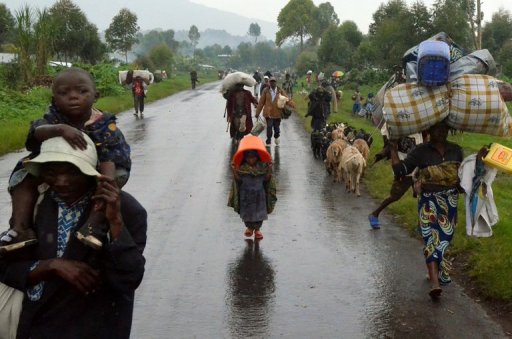The Complex Web of Violence Gets Messier in Congo
May 31, 2012 Leave a comment

Congolese residents flee fighting in Eastern Congo amid fears that Rwanda is backing the mutineers (AFP/File, Junior D.Kannah)
The eastern region of the Democratic Republic of the Congo, particularly the provinces of North and South Kivu, has long had the reputation of being one of the most violent and chaotic places on the continent. Furthermore, recent splurges of mass violence mark a definite deterioration in the already critical humanitarian situation, especially with regards to troubled relations with Rwanda.
A leaked internal UN report seen by the BBC and Global Post on Monday accused neighbouring Rwanda of supplying weapons and soldiers to rebels linked to General Bosco Ntaganda in eastern DR Congo. UN officials interviewed 11 rebel deserters, all of whom claimed to be Rwandan citizens. They said they were recruited and trained in Rwanda earlier this year before being transported across the border to join a rebellion, dubbed March 23 Movement or M23, kick-started by Ntaganda, who is wanted for war crimes by the International Criminal Court. After training, some of the recruits said they were told they would be fighting the Congolese government while others were told they would be defending Congolese Tutsis against persecution.
“All those who have been arrested after the last fighting are telling the same story,” Lambert Mende, Congo’s communications minister said, adding that an inquiry was under way and Congo government itself was not accusing Rwanda of supporting the rebels. Rwanda is denying it, and we don’t have any reason to doubt what they’re saying at this time,” he said.
In turn, Rwanda has rejected the claims made by the recent UN report. The Rwandan Minister of Foreign Affairs and Cooperation, Louise Mushikiwabo, called the report as “categorically false and dangerous rumours.” She criticized the international community for “neglecting real issues of stability by limiting itself to symptoms instead of the root cause of suffering in our region.”
Mushikiwabo slammed the UN force in DRC (MONUSCO) stating that “the billion-dollar-a-year operation makes up one quarter of the UN’s entire peacekeeping budget, and yet it has been a failure from day one. Instead of pursuing its mandate to eradicate the FDLR menace and help stabilize the region, MONUSCO has become a destabilizing influence, primarily concerned with keeping hold of its bloated budgets and justifying its ongoing existence.”
Rumors of Rwandan support for the new rebel movement have surfaced for weeks, but the UN debrief of deserters offers the first evidence that will likely ratchet up already tense relations between Kinshasa and Kigali.
The two Great Lakes neighbors have a troubled history and now again it’s going to get even more messy. Rwanda in the past has accused Congo of harboring Rwandan Hutu fighters who fled across the border after carrying out the 1994 genocide. But Rwanda in turn has backed a succession of rebellions in eastern Congo over more than a decade of violence that has claimed the lives of over 7 million Congolese.
In 2008, U.N. investigators accused Rwanda of arming the National Congress for the Defence of the People (CNDP), led by renegade Congolese Tutsi General Laurent Nkunda and later Bosco Ntaganda, which after 2009 peace deal integrated the rebel troops into the Congolese army and made Bosco an army general. This brief period seemed to usher in a new era of cooperation between the two countries, but after international pressure to arrest Bosco spiked a few months ago, not only has violence exponentially started again but neighbor tensions between Rwanda and Congo have created more complexities to the already thorny causes and effects of conflict in Congo. It is extremely exasperating seeing the cycle of violence repeat itself while the number of internally displaced people (IDPs) in the DRC has now reached more than two million as of March 31, according to the United Nations Office for the Coordination of Humanitarian Affairs (OCHA).
